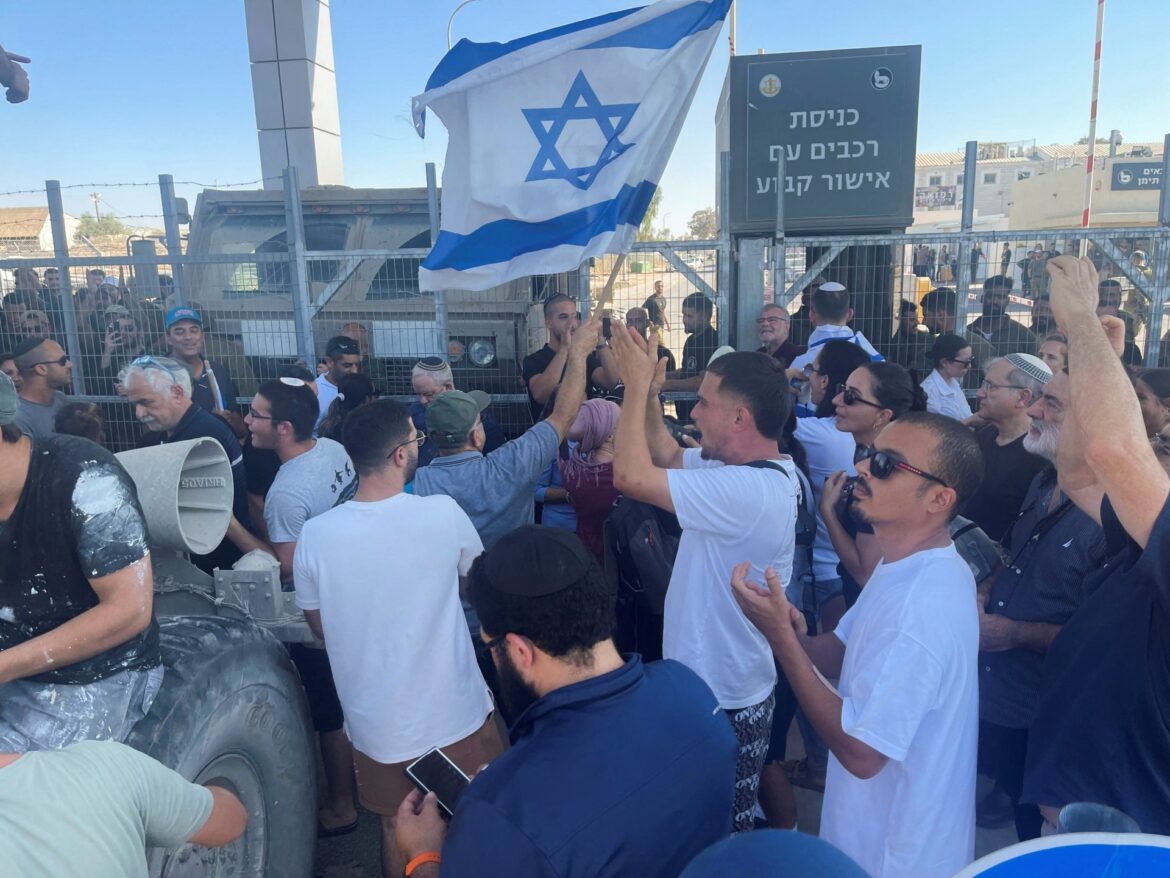Israel has arrested nine soldiers working at the Sde Teiman detention camp in the Naqab desert (Negev), accused of abusing Palestinians held there.
The base, which has been compared to Guantanamo, has been used as a holding facility for Palestinians arrested in Gaza and held without charge. Many now view the soldiers’ detention as evidence of the mistreatment of prisoners. According to reports by human rights organizations, at least 13 prisoners have died as a result of mistreatment in Israeli prisons (and the Israeli newspaper Haaretz has reported the figure as high as 27) since October 7, when Israel’s current war on Gaza began.
However, right-wing Israelis – including ministers and prominent politicians – reacted angrily to the soldiers’ arrest on Monday, and a crowd broke through the gates of Sde Teiman in an attempt to free the soldiers. The detained soldiers were taken to another facility.
What is Israel accused of doing to Palestinian prisoners in Sde Teiman?
Members of a unit known as Force 100 have allegedly committed “serious abuses” against Palestinian prisoners. Israeli media reported that one prisoner was taken to hospital after sustaining serious injuries that left him unable to walk. Medical officials reportedly said the “serious buttock injury” could not have been self-inflicted.
Abuses against Palestinian prisoners have already been reported at Sde Teiman. A Palestinian journalist detained at the base told a lawyer that he witnessed rapes of Gaza detainees.
International media outlets such as CNN and the Associated Press (AP) have also reported on the conditions of detention at Sde Teiman. The CNN report, based on the testimony of three Israelis who worked at the base, said that Palestinians detained without charge were blindfolded, beaten and held in painful positions. Whistleblowers claimed that some prisoners even had their limbs amputated after being severely injured by being constantly handcuffed.
An employee who spoke to the AP said most of the detainees were forced to wear diapers and were not allowed to use the bathroom. The same report said some of those held at the base appeared to be noncombatants and that diseases were widespread because of the conditions in which the prisoners were held.
Is it only in Sde Teiman that these abuses are reported?
Similar allegations have been reported in prisons holding Palestinians across Israel and the occupied West Bank.
Tel Aviv Tribune journalist Hind Khoudary reported that eight former prisoners were tortured and deprived of medicine and clothing. Some of them showed signs of physical abuse on their bodies.
Another released prisoner, Muhammad Abu Salmiya – director of Gaza’s al-Shifa hospital – said that several detainees had died in interrogation centers and that prisoners had been beaten.
Is this not torture under international law?
The Convention against Torture and Other Cruel, Inhuman or Degrading Treatment or Punishment, adopted by the United Nations General Assembly in 1984, defines torture as “any act by which severe pain or suffering, whether physical or mental, is intentionally inflicted on a person” for the purpose, among other things, of extracting information or a confession, or of punishing an act suspected of having been committed.
The description of acts committed against Palestinian prisoners in Israeli jails, if proven, would appear to fit this definition.
Amnesty International has previously called on Israel to end what it calls “widespread torture” in its prisons, saying it has documented 31 cases of prisoners held incommunicado and found credible evidence of widespread torture.
How did Israel respond to the allegations?
Despite numerous reports of prisoner abuse and deaths, Israel has so far never publicly acknowledged the existence of an investigation into the conduct of soldiers and guards working in the prisons.
However, with increased attention on Israel following the South African genocide case at the International Court of Justice, and arrest warrants for Prime Minister Benjamin Netanyahu and Defense Minister Yoav Gallant requested by the International Criminal Court’s chief prosecutor, it appears that the country is under increased pressure to act.
The Israeli military has launched an investigation into prisoner abuses at Sde Teiman, and nine soldiers have been detained for questioning.
The decision, however, angered many Israelis who oppose any sanctions for abuses against Palestinians.
After a confrontation between Sde Teiman soldiers and another force that came to arrest the accused soldiers, a crowd gathered at the gates of the base and forced entry.
The protesters then attempted to enter the Beit Lid military base, where the detained soldiers had been taken.
How divided is Israel over detention of soldiers?
The Israeli right has made its position clear: it opposes any judicial punishment for soldiers and considers the mistreatment of Palestinian detainees justified. A member of the Israeli parliament told a committee meeting that it was “legitimate” to do anything if the detainee was a member of Hamas’ elite forces, including shoving a stick up his rectum.
Far-right National Security Minister Itamar Ben-Gvir said Monday he was traveling to Sde Teiman to demand the soldiers’ release, while parliament’s Foreign Affairs and Defense Committee chairman Yuli Edelstein said he would hold a hearing Tuesday to discuss the arrests, calling them a “despicable pursuit of our soldiers” and “unacceptable.”
Army chief Herzi Halevi condemned the protests, and Netanyahu issued a short statement condemning the assault on the base and calling for calm.
Opposition leader Yair Lapid said the mob attack was an “attempted coup by an armed militia against a weak prime minister who is unable to control his government,” in a reminder of the deep divisions in Israeli politics and accusations Netanyahu faces of being forced to bow to the far right to keep his coalition alive.



